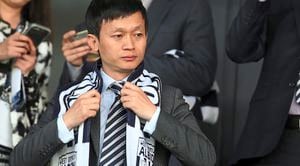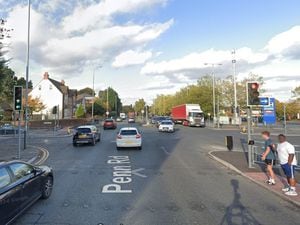Comment: Guochuan Lai’s current financial model for West Brom will not last in the Championship
When Guochuan Lai bought a controlling stake in the Baggies back in 2016, he was sold a self-sustaining Premier League club.

Two-and-a-half years later and that club is in the Championship, desperately fighting for promotion back to the promised land.
Supporters may be enjoying the breath of fresh air that is the second tier, but financially speaking, the clock is ticking.
Apart from a bizarre £6million purchase of Yuning Zhang – a player who can’t even get a work permit for England – and sponsorship of the training ground from Lai's company Palm, Albion’s owner has not invested any money into the club since his £200million purchase.
Lai still wants the club to be self-sustaining, but that is far more difficult in the Championship than the Premier League.
This week, the Express & Star revealed that chief executive Mark Jenkins has taken out an overdraft with Barclays in order to cover future wages this season and enable Albion to do more business in the January window.
Being in debt is not unusual in the Championship, but being in debt to a bank is.
As the brilliantly forensic football finance blog, the Swiss Ramble, recently pointed out, the majority of Championship clubs lean heavily on their owners for funds.
In the past 10 years, a whopping 87 per cent of Championship clubs’ cash has come from owner financing, with just seven per cent from operating activities.
Nineteen of the 24 Championship clubs have sourced between 70 per cent and 100 per cent of their funds from owners. The benefits of this are obvious.
As the blog states: “Despite high levels of debt in the Championship, much is provided by owners interest-free with no scheduled repayment dates.”
The Ramble then delivered a striking conclusion which slaps a huge question mark over Lai’s long-term model should Albion fail to win promotion in the next three years.
“The Championship is a division where most clubs require significant financing from their owners, largely to cover operating losses and fund player purchases, as they strive to reach the (wealthier) heights of the Premier League.”
Albion have received £41.5m in parachute payments this season, but should they fail to go up, that falls to £34m next season, and £15m the year after that.
After three years, they will be reliant on Championship TV money (currently around £7m), ticket sales (roughly £7m) and other commercial income and merchandising (around £12m in most recent figures).
The current wage bill is £38m. That’s unsustainable beyond this season, and should the Baggies fail to get promoted, will have to be trimmed.
Many of the big hitters who stayed this season will no doubt have to be sold, and the club will need another reboot.
The board have contingency plans if Albion don’t go up, and money recuperated from player sales will help the club compete for a couple of years.
Jenkins and the board have managed a significant downsizing this season quite well, particularly compared to the two other relegated clubs, Swansea and Stoke.
Loan deals for Harvey Barnes, Dwight Gayle, Tosin Adarabioyo and Mason Holgate have added quality without financial risk.
But there’s no getting away from the fact that winning promotion in the next two seasons is imperative under this particular financial model.
Without parachute payments or investment from an owner, it will become increasingly difficult to keep Albion competitive in this division.
The other string to Albion’s bow could be their academy. Mark Harrison and his team continue to churn out an impressive number of youngsters.
Behind the well-known faces of Sam Field, Rekeem Harper, Kyle Edwards and Jonathan Leko are promising England youth internationals like Rayhaan Tulloch, Jamie Soule, Morgan Rogers, Nathan Ferguson and Louie Barry.
The future is bright, and those players could be needed in years to come.
But if Albion’s stay in the Championship lasts beyond three years, something will have to change further up.
Lai will either need to change his model and invest significant funds to keep the club on par with others, or he will need to cut his losses and sell to an owner who will.





